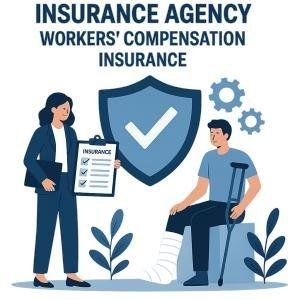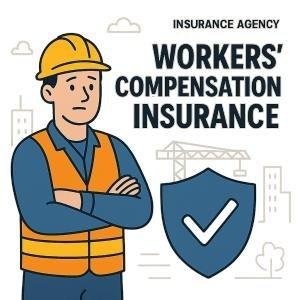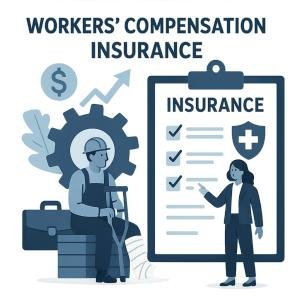
Mergers & Acquisitions: Due Diligence on Workers Comp Liabilities
September 11, 2025
Best Workers’ Comp Carriers for Georgia Security Guard Companies in 2024
September 11, 2025In the dynamic field of mobile patrol security services, ensuring thorough workers’ compensation insurance is a critical component for both business continuity and employee protection. Mobile patrol security guard workers face unique occupational risks that demand tailored insurance coverage to address potential workplace injuries and liabilities. This article delves into the essential aspects of workers’ comp insurance for mobile patrol security personnel, highlighting key coverage elements, regulatory considerations, and best practices for mitigating financial exposure. Understanding these fundamentals empowers security firms to safeguard their workforce while maintaining compliance and operational resilience.
Table of Contents
- Understanding the Unique Risks and liabilities for Mobile Patrol Security Guards
- Comprehensive Coverage Options Tailored to Mobile Patrol Security Workers
- Best Practices for Securing and Managing Workers Comp Insurance Policies
- Key Recommendations for Compliance and Risk Mitigation in Mobile Patrol Security Operations
- Q&A
- Future Outlook
Understanding the unique Risks and Liabilities for Mobile Patrol Security Guards
Mobile patrol security guards face a distinct set of risks that differentiate their job from conventional static security roles. The constant movement across various sites exposes them to hazards such as vehicular accidents, unpredictable environmental conditions, and potential confrontations in unfamiliar or unsecured locations. Unlike stationary guards, these workers frequently enough interact with a wider range of threats, including sudden emergencies or trespassers attempting to evade detection, increasing their vulnerability to injuries. Understanding these unique circumstances is crucial for tailoring workers’ compensation coverage that effectively mitigates the financial and medical impacts of such incidents.
When determining appropriate coverage levels, it is crucial to consider the following factors that contribute to heightened liability:
- Vehicle-related risks: Accidents or mechanical failures during patrol duties.
- Exposure to violence: Potential altercations or attacks in remote or isolated areas.
- Variable working environments: From industrial complexes to residential neighborhoods, each with distinct challenges.
- Physical strain: Frequent walking, climbing, or rapid response demands increasing injury likelihood.
| Risk Category | Potential Injuries | Coverage Consideration |
|---|---|---|
| Vehicle Accidents | Wreck injuries, whiplash | comprehensive auto coverage plus medical benefits |
| Violent Encounters | Assault injuries, trauma | Enhanced personal injury protection |
| Environmental Hazards | Slips, falls, weather-related illnesses | Robust general liability and medical coverage |
Comprehensive Coverage Options Tailored to Mobile Patrol Security Workers
Securing the right protection plan is paramount for mobile patrol security workers who navigate dynamic environments daily. Policies designed specifically for this sector not only cover standard workplace injuries but also address unique risks such as vehicular accidents, assaults, and equipment-related hazards. These comprehensive packages often include medical expense coverage, disability benefits, and compensation for lost wages, ensuring financial stability during recovery periods. Moreover, tailored insurance plans incorporate preventive risk management services, helping employers implement safer operational protocols and reduce claim frequency.
When evaluating coverage options, it’s essential to consider several key features that align with the mobile nature of patrol duties:
- Roadside Accident Liability: Protection against incidents occurring while on patrol routes.
- Assault and Violence Coverage: Benefits for injuries from confrontations encountered in the line of duty.
- Equipment and Vehicle Damage: Inclusion of costs related to patrol cars and essential gear repairs or replacement.
- Flexible Benefit Limits: Customizable coverage to match specific operational scales and workforce sizes.
| Coverage Type | Applicable Risk | Benefit Highlights |
|---|---|---|
| Medical & Disability | Injuries on duty | Covers treatment, rehabilitation, and lost wages |
| Vehicle & Equipment | Accidents, theft, or damage | Pays for repair and replacement costs |
| Violence & Assault | Physical confrontations | Provides trauma and recovery support |
Best Practices for Securing and managing Workers Comp Insurance Policies
To effectively secure and manage workers comp insurance policies for mobile patrol security guards, it is indeed vital to conduct a thorough risk assessment specific to the unique demands of the role. Factors such as the geographical areas patrolled, frequency and duration of shifts, and potential exposure to hazardous situations should inform coverage decisions. Partnering with an insurer experienced in security services can lead to tailored policies that address these variables. Additionally, maintaining detailed employee records, including training certifications and incident reports, not only enhances policy management but also supports smooth claims processing.
Best practices include:
- Regularly reviewing and updating coverage limits to reflect changes in workforce size and job complexity
- Implementing safety training programs aligned with insurer requirements
- Utilizing technology for real-time reporting of workplace incidents
- Conducting periodic audits on policy compliance and claims history
| Practice | Benefit |
|---|---|
| Safety training | Reduces claim frequency and premiums |
| Policy Audits | Identifies coverage gaps early |
| Accurate Record-Keeping | Speeds claims processing |
| customized Risk Assessment | Ensures appropriate coverage |
Key Recommendations for Compliance and Risk Mitigation in Mobile Patrol Security Operations
establishing stringent operational protocols is critical to reducing liability and ensuring safety in mobile patrol services. Regular training sessions should focus on hazard recognition,emergency response,and proper reporting procedures to maintain compliance with industry regulations. Additionally, integrating advanced GPS tracking and real-time communication tools not only enhances patrol efficiency but also provides documented accountability, which is essential for insurance claims and audits.
Risk management strategies must also incorporate comprehensive insurance coverage tailored specifically to protection against workplace injuries common in mobile patrol roles. Essential components include:
- Workers’ Compensation Insurance: covers medical expenses and lost wages if a guard is injured on duty.
- General Liability Insurance: Protects against third-party claims resulting from operational mishaps.
- Vehicle Insurance: Ensures coverage for patrol vehicles against accidents or damages incurred during service.
| Insurance Type | Coverage Focus | Key Benefit |
|---|---|---|
| Workers’ Compensation | Employee injury | Medical & wage protection |
| General Liability | Third-party claims | Legal defense & settlements |
| Vehicle Insurance | Patrol vehicles | Damage & liability coverage |
Q&A
Q&A: Mobile Patrol Security guard Workers’ Comp Insurance-Coverage Essentials
Q1: What is workers’ compensation insurance for mobile patrol security guards?
A1: Workers’ compensation insurance for mobile patrol security guards provides coverage for medical expenses,lost wages,and rehabilitation costs if the guard sustains a work-related injury or illness while on duty. This insurance is designed to protect both the employee and the employer from financial liabilities arising from occupational hazards.
Q2: Why is workers’ comp insurance critical for mobile patrol security services?
A2: Mobile patrol security guards face unique risks, including potential violence, vehicular accidents, and environmental hazards while patrolling various locations. Workers’ comp insurance ensures that injured guards receive timely medical care and wage replacement,reducing legal exposure for employers and enhancing workforce stability.
Q3: What types of injuries are commonly covered under this insurance for mobile patrol workers?
A3: Injuries commonly covered include physical harm from assaults,slip-and-fall accidents,motor vehicle collisions,repetitive stress injuries,and exposure to hazardous environments. Coverage may also extend to occupational illnesses related to prolonged on-site exposure to harmful conditions.
Q4: How does the liability risk of mobile patrol differ from stationary security roles in relation to workers’ comp?
A4: Mobile patrol workers are frequently in transit, interacting with varying environments and unpredictable conditions, which can increase the likelihood of accidents or violence. As a result, workers’ comp policies for mobile patrols often account for higher risk factors and may have different premium structures compared to stationary security positions.
Q5: What factors influence the cost of workers’ compensation insurance for mobile patrol security companies?
A5: Key factors include the number of employees, the level of risk associated with patrol routes, historical claims data, the presence of safety training programs, and the overall claims management strategy. Insurance providers also consider the company’s risk management policies and compliance with occupational safety regulations.
Q6: Are there specific state regulations that mobile patrol security companies must consider regarding workers’ comp insurance?
A6: Yes. Workers’ compensation requirements vary by state, and mobile patrol companies must adhere to the specific statutes governing coverage limits, reporting procedures, and employee classifications in their jurisdiction. It is indeed essential to consult state guidelines to ensure compliance and avoid penalties.
Q7: How can mobile patrol security firms minimize workers’ comp claims and associated costs?
A7: Companies can reduce claims by implementing comprehensive safety training, enforcing strict vehicle operation protocols, providing adequate protective equipment, conducting regular risk assessments, and fostering a culture of safety awareness. Prompt incident reporting and effective claims management also play critical roles.
Q8: What steps should a mobile patrol security business take when selecting a workers’ compensation insurance provider?
A8: Businesses should evaluate insurers based on their experience with security industry claims, financial stability, coverage options, premium rates, and customer service reputation. Working with brokers specializing in the security sector can definitely help tailor policies to meet specific operational needs.
Q9: Does workers’ comp insurance cover damages caused by mobile patrol security guards to third parties?
A9: Workers’ compensation insurance specifically covers injuries to employees.Liability coverage for damages to third parties caused by security guards would require additional policies,such as general liability or professional liability insurance.
Q10: How does securing appropriate workers’ comp insurance benefit mobile patrol security employees?
A10: Proper insurance coverage guarantees that employees receive prompt medical treatment and financial support during recovery from workplace injuries.This protection fosters employee confidence and retention, contributing to a safer and more stable workforce within the mobile patrol security industry.
Future Outlook
securing comprehensive workers’ compensation insurance is essential for mobile patrol security guard businesses to protect both their workforce and their operations. Understanding the specific coverage requirements and risks associated with mobile patrol duties ensures that companies are adequately prepared for unforeseen incidents. By investing in tailored workers’ comp policies, businesses not only comply with legal obligations but also foster a safer, more resilient working environment. Prioritizing these coverage essentials ultimately supports sustained operational success and peace of mind for all stakeholders involved.
“This content was generated with the assistance of artificial intelligence. While we strive for accuracy, AI-generated content may not always reflect the most current information or professional advice. Users are encouraged to independently verify critical information and, where appropriate, consult with qualified professionals, lawyers, state statutes and regulations & NCCI rules & manuals before making decisions based on this content.







